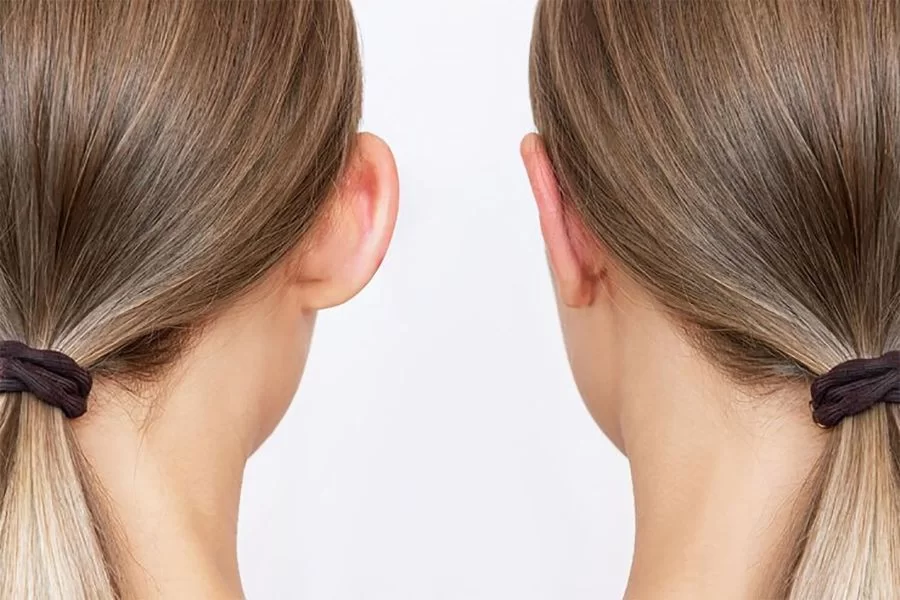Ear Reshaping Surgery in Abu Dhabi
Elyzee Hospital is one of the best medical centers in Abu Dhabi, specializing in Ear Reshaping Surgery.

Ear Reshaping Surgery: Enhancing Your Ear Aesthetics
Ear reshaping surgeries are a popular solution for individuals looking to improve certain features related to their outer ears. This type of cosmetic procedure commonly referred to as otoplasty or ear pinning surgery addresses concerns such as lopsidedness of the outer ear structure and overly large sizes that some people may find unappealing. Additionally it can remedy abnormalities in the shape of ones auricles including misshapen lobes due to injuries or congenital defects alike. By reshaping the ears, this procedure aims to enhance facial harmony and boost self-confidence.
The Benefits of this Procedure
Ear reshaping surgery offers several benefits, both cosmetic and psychological, including:
1. Improved appearance
One of the primary benefits of ear reshaping surgery is the enhancement of the ear aesthetics. By correcting prominent ears or asymmetrical ear shape, this procedure can create a more balanced and proportionate appearance.
2. Enhanced Self Assurance
A considerable number of people with noticeable or asymmetrical ears may experience insecurity or a lack of self assurance. Ear reconstruction surgery can serve as a noteworthy catalyst to magnify ones’ self-respect. Enabling such individuals to feel more at ease and confident about their looks.


3. Solving Irregular Ear Structures
Patients who face irregular shapes or sizes of their outer ear such as bat ears,cupped ears, and large lobes can seek treatment through cosmetic surgery procedures like ear reshaping surgeries. This easy solution helps mitigate the issue by bringing back proper symmetry that would directly impact one’s appearance and self-confidence positively. The procedure can create a more natural and aesthetically pleasing ear shape.
4. Youthful look
Ear reshaping surgery can also address issues related to aging, such as stretched or sagging earlobes. By rejuvenating the earlobes, individuals can achieve a more youthful and refreshed appearance.
The Best Candidate for this Procedure
- The ideal candidate for ear reshaping surgery is someone who:
- Is in good overall health: Good general health is essential to undergo any surgical procedure safely
- Has realistic expectations: It is important to have realistic expectations about the outcomes of the procedure and understand its limitations.
- Is physically mature: In most cases, ear reshaping surgery is performed on individuals who have reached their full ear development, typically around the age of 6 or older.
- Has specific concerns about their ears: The best candidates for this procedure are individuals who are bothered by the appearance of their ears, such as prominent ears or asymmetry, and wish to improve their ear aesthetics.
Consultation with Doctor and Preparation for the Procedure
During the initial consultation, the plastic surgeon will evaluate the patient’s ears, discuss their concerns and desired outcomes, and determine their candidacy for the procedure. They will review the medical history, previous surgeries, and any medications or allergies to ensure the safety and effectiveness of the surgery.
Preparation for ear reshaping surgery may involve ceasing certain medications or supplements that can increase the risk of bleeding, quitting smoking if applicable, and following any specific pre-operative instructions provided by the surgeon.
What's Happening During the Procedure
Ear reshaping surgery is typically performed on an outpatient basis under local or general anesthesia, depending on the complexity of the procedure and the patient’s preference. The surgery involves several key steps:
1. Incision placement: The surgeon will make incisions behind the ears or within the natural creases to minimize visible scarring.
2. Cartilage manipulation: The surgeon will reshape the cartilage of the ears to achieve the desired aesthetic outcome. Techniques may include scoring, folding, or removing excess cartilage.
3. Ear repositioning: If necessary, the surgeon will reposition the ears closer to the head for a more balanced appearance.
4. Closure: The incisions are meticulously closed using sutures or surgical adhesive to ensure proper healing and minimal scarring.
Make An Appointment

